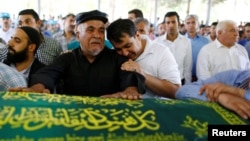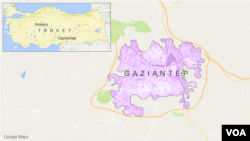Turkey is backing away from claims that a child suicide bomber sent by Islamic State carried out for Saturday's blast at a Kurdish wedding, killing 54 people.
Prime Minister Binali Yildirim on Monday said speculation that a child was responsible was based on rumors from witnesses.
"We do not have a clue about who the perpetrators behind the attack were. Early information on who did the attack, in what organization's name, is, unfortunately, not right," he told reporters.
President Recep Tayyip Erdogan earlier described the bomber as being between 12 and 14 years old and sent by Islamic State. Nearly all the victims were Kurds younger than 18.
No one has claimed responsibility, but the style of the attack and the type of bomb used were similar to previous blasts blamed on Islamic State.
The bomber attacked a Kurdish wedding and celebration in Gaziantep, a city just 60 kilometers north of Syria and a prominent refugee community for people looking to escape the five-year civil war in Syria.
Turkish Foreign Minister Mevlut Cavusoglu vowed Monday his country would "completely cleanse" Islamic State militants from its border region with Syria.
On Tuesday, Turkish soldiers launched a barrage of shells into Islamic State-held territory along Syria's northern border in retaliation for an IS mortar attack. Turkish media report that 40 shells were fired.
The British-based Syrian Observatory for Human Rights reports rebel fighters were massing inside Turkey to carry out an offensive on the Islamic State-held Syrian town of Jarablus. Cavusoglu did not confirm the rebel plans, but said Ankara supports any group fighting Islamic State.
The Gaziantep attack came amid continuing turmoil in Turkey in the month after Erdogan's government survived an attempted coup by rogue military officers, which the Turkish leader has blamed on U.S.-based cleric Fethullah Gulen.
WATCH: Turkey Cites Terrorism in Fatal Blast at Wedding
In an earlier written statement, Erdogan said there is "no difference" between Islamic State, the militants of the outlawed Kurdistan Workers' Party, the PKK, and Gulen's followers.
"Our country and our nation have again only one message to those who attack us - you will not succeed!" he said.
The White House condemned the Gaziantep attack, saying the "perpetrators of this barbaric act cynically and cowardly targeted a wedding." The statement Sunday added that Vice President Joe Biden will visit Ankara Wednesday to reaffirm the U.S. commitment to work together with Turkey against the "scourge of terrorism."
Blast sparks outrage
Witnesses said the blast, the deadliest terror attack in Turkey this year, occurred in a packed street of people dancing and celebrating the marriage.
Speaking Sunday while surveying the wreckage, local resident Ibrahim Ozdemir said people are in shock.
”Our friends and neighbors were there. We are so sad and in pain. The attack is an atrocity." He said, "We want to end these massacres. We are in pain, especially the women and children.”
The Turkish city is about 90 kilometers from the Syrian city of Manbij. A U.S. backed coalition of Syrian fighters and Kurds earlier this month drove Islamic State fighters from that city after a two-month siege, pushing them into the countryside northward toward the Turkish border.
Shortly after Saturday's bombing, the pro-Kurdish political party HDP condemned the attack, while noting it came just hours after a Kurdish militant organization battling the Ankara government for autonomy announced new plans to try to end the decades-long conflict.
The so-called Group of Communities in Kurdistan, the KCK, which includes the outlawed PKK, said it is ready to resume peace talks with Ankara, but said the government should take the first step. A KCK statement also said those overtures are supported by "friendly" countries and non-government organizations both inside and outside Turkey.
The statement also said the Gaziantep attack "targets those determined and consistent in peace ... and those struggling for democracy, equality and freedom."
The PKK launched an armed rebellion in 1984, seeking an autonomous homeland in a vast area of the southeast bordered by Syria, Iraq and Iran. Nearly 50,000 people have been killed in the fighting.
Last year, the armed wing of the PKK scrapped a three-year cease-fire with Ankara, after Turkish warplanes struck the group's military training bases in northern Iraq while PKK fighters battled Islamic State militants. Ankara also bombed several other PKK bases.







